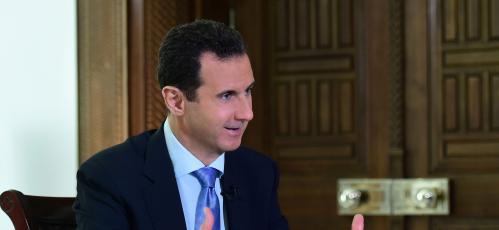The airstrikes that President Trump authorized against regime targets in Syria strike Daniel Byman as “an attempt at therapy to salve our anguished conscience,” he writes, adding that it feels like we are taking a stand than a serious move to change our policy in Syria for the better. This piece originally appeared on Lawfare.
As someone who advocated that the administration to take a harder stance against the regime of Bashar Assad when the civil war first began, I should be pleased that the Trump administration launched cruise missiles against a Syrian regime airfield—but I’m nervous instead. The bombing strikes me more as an attempt at therapy to salve our anguished conscience and feel like we are taking a stand than a serious move to change our policy in Syria for the better.
The missile strikes occurred after the Syrian regime used a nerve agent (probably sarin) to kill dozens of civilians, including many children, in rebel-held parts of Idlib Province. Trump justified the strikes as a way to “prevent and deter the spread and use of deadly chemical weapons,” and it’s hard not to share the President’s outrage over the Assad regime’s willingness to slaughter its own citizens in such a horrific way.
The strikes represent a dramatic shift in the administration’s policy. When he came into office, it seemed that Trump wanted to work with Russia in Syria against the Islamic State and implicitly accepted that Russia’s ally, the Assad regime, would stay in power. Just a few days ago, Secretary of State Rex Tillerson and UN Ambassador Nikki Haley seemed to signal that the United States was no longer committed to removing Assad. Peace talks, not bombs, seemed to be in the cards.
I’m pleased that the Trump administration no longer wants to cozy up to one of the world’s bloodiest dictators, one backed by Iran no less. In addition, our policy in Syria is no longer in sync with Moscow, and that’s a good thing. Allying with Russia in the Middle East would anger U.S. allies and get the United States little in return. So making a break from Russia here is promising, and I hope a sign that the administration will stand up to Moscow in Europe and elsewhere.
However, I regret that it took another use of chemical weapons, as opposed to the slaughter of perhaps 500,000 people in Syria’s civil war, to move America’s conscience. If the strike does achieve the President’s objective and Assad no longer uses chemical weapons against his own people, that’s good news—but it is little consolation for the tens of thousands of Syrians who are likely to die in the coming months from regime barrel bombs or indiscriminate Russian airstrikes or to be tortured and killed in the dictator’s prisons.
Nor do one-off attacks like the one we launched have a good track record. In a civil war that has claimed so many dead, the military impact of a missile strike on one facility is limited, even if it signals a profound shift in U.S. policy. Rather, such actions often are painted as “symbolic,” but in reality they usually signal weakness, not resolve. The dictator or terrorist on the receiving end suffers little but often looks stronger because they survived a U.S. attack and can boast about their defiance. In 1998, after al-Qaida bombed two U.S. embassies in Africa, the United States launched cruise missiles against facilities believed to be linked to terrorists in Afghanistan and Sudan—Operation Infinite Reach. The strikes backfired, allowing Bin Laden to claim he was standing up to the United States. His popular support and associated ability to recruit soared, and al-Qaida terrorism continued undiminished. Contrast this with the sustained drone campaign against al-Qaida that began under President George W. Bush in the years after 9/11 and took off under Obama. This devastated al-Qaida, but it required years and many many strikes.
If a more sustained bombing campaign followed the cruise missile strikes, it might affect Assad’s calculations more profoundly, but even then air power alone has many limits if there is no force on the ground to magnify its impact. If the U.S. goal is deterrence, as Trump suggested in his remarks, this often requires sustained and repeated actions to bolster credibility—so the most recent strike should only be the beginning.
I also worry that the about-face against the Assad regime is not coordinated diplomatically. We are acting in haste, without making sure that our use of force is serving our political strategy rather than determining it. It is not clear what we are asking Turkey, Saudi Arabia, and other potential partners to do differently or how we are trying to get Assad’s backers, particularly Russia (Iran is a lost cause on this) to decrease their support for the regime. Indeed, directly or indirectly we may be risking a military conflict with Russia, and even if the Trump administration wants to confront Moscow over Syria, such an escalation demands careful thought, coordination, and planning. Most important, it is unclear what political settlement the United States wants in Syria and which actors Washington wants to empower—we know what we don’t want, but it is less clear what we do want.
So we can feel good that we punched back against a dictator who is brutalizing his own people, but the bombing will do little to advance American goals in Syria without more dramatic and lasting changes.
The Brookings Institution is committed to quality, independence, and impact.
We are supported by a diverse array of funders. In line with our values and policies, each Brookings publication represents the sole views of its author(s).











Commentary
What effect will Trump’s airstrikes really have?
April 7, 2017